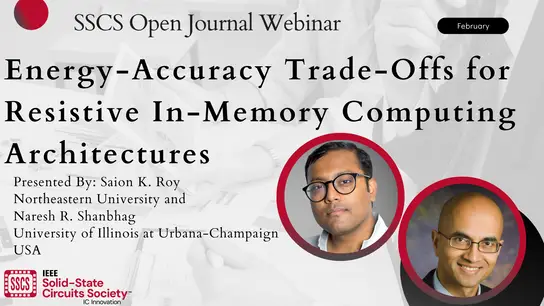-
Members: FreeSSCS
IEEE Members: $8.00
Non-members: $15.00Length: 01:15:00
21 Oct 2021
Abstract: An active network with the property that the impedance on a terminal pair is negative is called as a negative impedance, and many active circuits, such as amplifiers, filters, and oscillators, contain the negative impedance. A negative resistor (negative R) has been used since the days of the vacuum tube oscillators, in which the negative R compensates for resistive leakage of an inductor. In the late 1970s and early 1980s, an amplifier with a negative R on its virtual ground was proposed. The idea of using the negative R-assisted amplifier has been used in recent state-of-the-art works, as it turns out that the negative R compensates for the finite gain, bandwidth, noise and distortion of the amplifier. Despite many advantages, the negative R-assisted amplifier did not get the attention it deserves. The aim of this talk is, therefore, to reconsider some of these early concepts, and to evaluate the benefits of negative R-assisted amplifiers in the light of recent advances. Several design examples including amplifiers, PGAs, TIAs, and CT ?? modulators will be discussed.
Bio: Youngcheol Chae received his Ph.D. degree in Electrical and Electronic Engineering from Yonsei University, Seoul, Korea in 2009. During 2009-2011, he was a post-doctoral researcher at TU Delft in The Netherlands. Since 2012, he has been on the faculty at Yonsei University, where he is an associate professor. His work has focused on data converters and sensor interfaces. This results in 100+ technical papers, including 60+ SSCS conference and journal papers. He is a member of the technical program committees of International Solid-State Circuits Conference (ISSCC) and Asian Solid-State Circuits Conference (A-SSCC). He has served as a Guest Editor of the Journal of Solid-State Circuits (JSSC) and a Distinguished Lecturer (DL) of IEEE Solid-State Circuits Society (2018 to 2019). He received the Best Young Professor Award in Engineering from Yonsei University in 2018, the Hae-Dong Young Engineer Award from IEIE Korea in 2017, the Outstanding Research Award of Yonsei University (2017, 2019, 2020) and the Outstanding Teaching Awards of Yonsei University (2013, 2014).
Bio: Youngcheol Chae received his Ph.D. degree in Electrical and Electronic Engineering from Yonsei University, Seoul, Korea in 2009. During 2009-2011, he was a post-doctoral researcher at TU Delft in The Netherlands. Since 2012, he has been on the faculty at Yonsei University, where he is an associate professor. His work has focused on data converters and sensor interfaces. This results in 100+ technical papers, including 60+ SSCS conference and journal papers. He is a member of the technical program committees of International Solid-State Circuits Conference (ISSCC) and Asian Solid-State Circuits Conference (A-SSCC). He has served as a Guest Editor of the Journal of Solid-State Circuits (JSSC) and a Distinguished Lecturer (DL) of IEEE Solid-State Circuits Society (2018 to 2019). He received the Best Young Professor Award in Engineering from Yonsei University in 2018, the Hae-Dong Young Engineer Award from IEIE Korea in 2017, the Outstanding Research Award of Yonsei University (2017, 2019, 2020) and the Outstanding Teaching Awards of Yonsei University (2013, 2014).
Primary Committee:
SSCS


